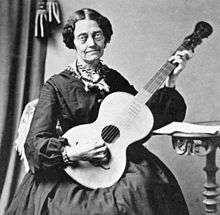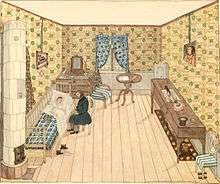Josabeth Sjöberg

Josabeth Sjöberg (30 June 1812 – 29 December 1882) was a Swedish painter and music teacher active in Stockholm.
Josabeth was born in to a wealthy home; her father was a clerk in a government department and her mother spent her days reading romantic novels. Josabeth was educated in piano and guitar-playing. As an adult, she became poor after the death of her parents, and supported herself as a governess and a music teacher in the private homes of the upper classes in Stockholm. Mamsell Sjöberg (Mademoiselle Sjöberg), as she was called,[1] was a well-known character in 19th-century Stockholm; she moved many times, but always within the same area of the city. She was a natural talent who painted during her free time. She portrayed the everyday life of the bourgeoisie and life in Victorian Stockholm in watercolor paintings. Her paintings were collected by Stockholm City Museum in 1936 and have been displayed several times in art exhibitions, including the 700-year jubilee of the city of Stockholm. They are technically unsophisticated, but display a great love of art and expression.
References
- Österberg, Carin et al., Svenska kvinnor: föregångare, nyskapare (Swedish women: predecessors, pioneers). Lund: Signum 1990. ( ISBN 91-87896-03-6)
- Gustaf Näsström, Mamsell Josabeth Sjöberg (Miss Josabeth Sjöberg) Norstedts/Esselte/Ditzinger, Stockholm (1954)
- Göran Axel-Nilsson, "Mamsell Sjöberg", i Samfundet S:t Eriks Årsbok, 1937
External sources
- Bo Lagercrantz: Josabeth Sjöbergs värld. Stockholms Stadsmuseum, 1968
- Hans Eklund, med bidrag av Göran Axel-Nilsson och Gustaf Näsström, Josabeth Sjöberg : målarmamsellen från 1800-talets Stockholm: en komplett bilderbok, Stockholm 1980
- Josabeth Sjöberg 1812-1882, Stockholm's City Museum, three pages in PDF format with text and pictures
- The Stockholm Source - screen-quality reproductions of most, if not all, of the paintings and drawings
